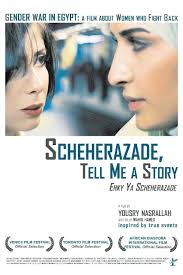
SCHEHERAZADE: TELL ME A STORY
Egypt, 2009, 135 minutes, Colour.
Mona Zakki, Mahmoud Hemeida.
Directed by Yousry Nasrallah.
This is a significant Egyptian film, especially in Egyptian film history, a long tradition, a diminishing of impact, researchers at the beginning of the 21st-century.
The screenplay is by the veteran writer, Wahid Ahmed (hes The Yacoubian Building was seen internationally). He has a place in the tradition of the Egyptian cinema. However, the director was more associated with arthouse cinema.
The social significance of the film is in its portrayal of women in Egyptian society. A long tradition of strong female stars had declined into conventional presentations of women in Egyptian films – wives and mothers, sisters, fiancés… The director of noted that in making his film he was very conscious of misogyny in Egyptian society.
The central character is Hebba, presenting on television, political discussion, a private network, not public. The contrast, her husband is a deputy editor of a government owned paper, with high ambitions. Political leaders indicate to him that his wife’s career could be a hindrance to his promotion, that she should stay away from politics.
At the centre of the film is a new series of talk shows that the wife develops. The comparison is made of her listening to the character from A Thousand and One Nights, Scheherazade, the women telling their stories to stay alive.
As expected, with women’s political issues, misogynistic men attack her, issues of abuse, sexual abuse, religious abuse, and repression, leading to the breakup of her marriage.
This is a film of Egyptian storytelling, Egyptian women’s storytelling, the desperation of some of the stories, their not being heard, and some dire consequences for those who tell them and listen to them.